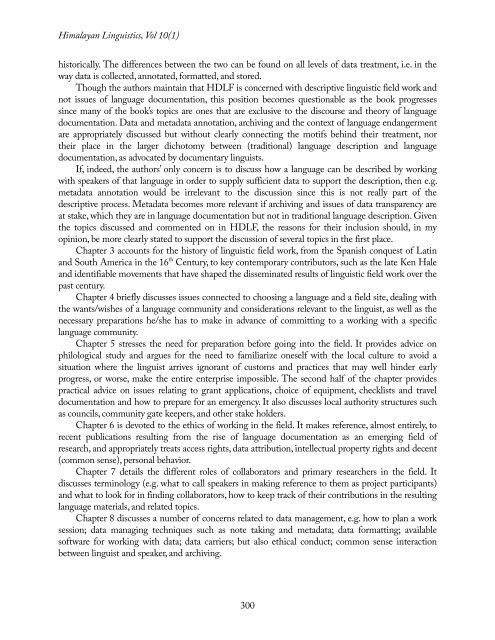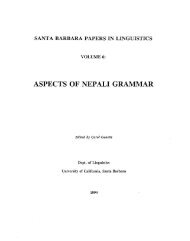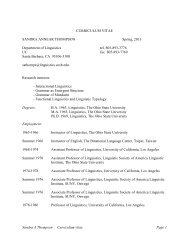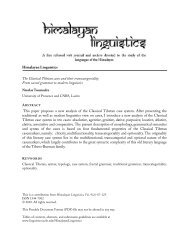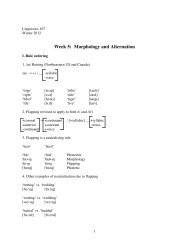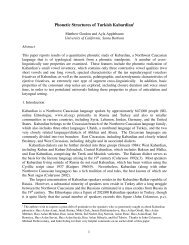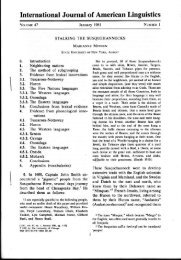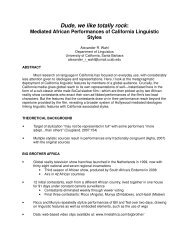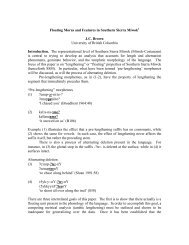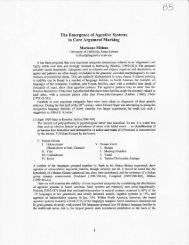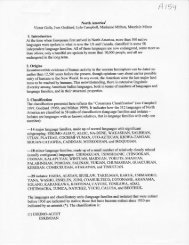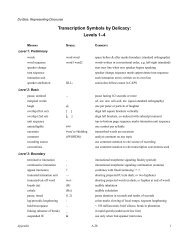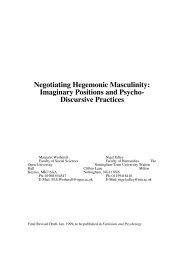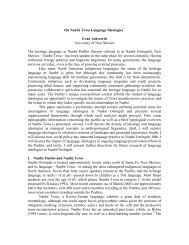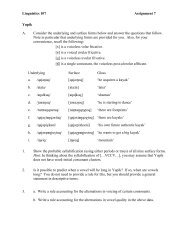himalayan linguistics - UCSB Linguistics - University of California ...
himalayan linguistics - UCSB Linguistics - University of California ...
himalayan linguistics - UCSB Linguistics - University of California ...
You also want an ePaper? Increase the reach of your titles
YUMPU automatically turns print PDFs into web optimized ePapers that Google loves.
Himalayan <strong>Linguistics</strong>, Vol 10(1)<br />
historically. The differences between the two can be found on all levels <strong>of</strong> data treatment, i.e. in the<br />
way data is collected, annotated, formatted, and stored.<br />
Though the authors maintain that HDLF is concerned with descriptive linguistic field work and<br />
not issues <strong>of</strong> language documentation, this position becomes questionable as the book progresses<br />
since many <strong>of</strong> the book’s topics are ones that are exclusive to the discourse and theory <strong>of</strong> language<br />
documentation. Data and metadata annotation, archiving and the context <strong>of</strong> language endangerment<br />
are appropriately discussed but without clearly connecting the motifs behind their treatment, nor<br />
their place in the larger dichotomy between (traditional) language description and language<br />
documentation, as advocated by documentary linguists.<br />
If, indeed, the authors’ only concern is to discuss how a language can be described by working<br />
with speakers <strong>of</strong> that language in order to supply sufficient data to support the description, then e.g.<br />
metadata annotation would be irrelevant to the discussion since this is not really part <strong>of</strong> the<br />
descriptive process. Metadata becomes more relevant if archiving and issues <strong>of</strong> data transparency are<br />
at stake, which they are in language documentation but not in traditional language description. Given<br />
the topics discussed and commented on in HDLF, the reasons for their inclusion should, in my<br />
opinion, be more clearly stated to support the discussion <strong>of</strong> several topics in the first place.<br />
Chapter 3 accounts for the history <strong>of</strong> linguistic field work, from the Spanish conquest <strong>of</strong> Latin<br />
and South America in the 16 th Century, to key contemporary contributors, such as the late Ken Hale<br />
and identifiable movements that have shaped the disseminated results <strong>of</strong> linguistic field work over the<br />
past century.<br />
Chapter 4 briefly discusses issues connected to choosing a language and a field site, dealing with<br />
the wants/wishes <strong>of</strong> a language community and considerations relevant to the linguist, as well as the<br />
necessary preparations he/she has to make in advance <strong>of</strong> committing to a working with a specific<br />
language community.<br />
Chapter 5 stresses the need for preparation before going into the field. It provides advice on<br />
philological study and argues for the need to familiarize oneself with the local culture to avoid a<br />
situation where the linguist arrives ignorant <strong>of</strong> customs and practices that may well hinder early<br />
progress, or worse, make the entire enterprise impossible. The second half <strong>of</strong> the chapter provides<br />
practical advice on issues relating to grant applications, choice <strong>of</strong> equipment, checklists and travel<br />
documentation and how to prepare for an emergency. It also discusses local authority structures such<br />
as councils, community gate keepers, and other stake holders.<br />
Chapter 6 is devoted to the ethics <strong>of</strong> working in the field. It makes reference, almost entirely, to<br />
recent publications resulting from the rise <strong>of</strong> language documentation as an emerging field <strong>of</strong><br />
research, and appropriately treats access rights, data attribution, intellectual property rights and decent<br />
(common sense), personal behavior.<br />
Chapter 7 details the different roles <strong>of</strong> collaborators and primary researchers in the field. It<br />
discusses terminology (e.g. what to call speakers in making reference to them as project participants)<br />
and what to look for in finding collaborators, how to keep track <strong>of</strong> their contributions in the resulting<br />
language materials, and related topics.<br />
Chapter 8 discusses a number <strong>of</strong> concerns related to data management, e.g. how to plan a work<br />
session; data managing techniques such as note taking and metadata; data formatting; available<br />
s<strong>of</strong>tware for working with data; data carriers; but also ethical conduct; common sense interaction<br />
between linguist and speaker, and archiving.<br />
300


